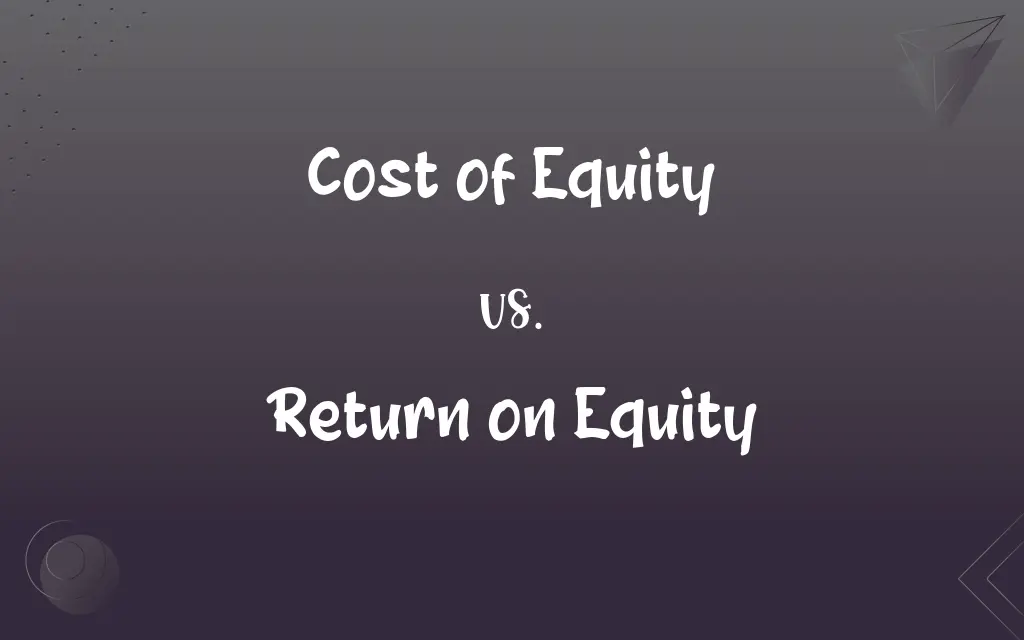Cost of Equity vs. Return on Equity: What's the Difference?
Edited by Aimie Carlson || By Harlon Moss || Published on January 5, 2024
Cost of equity is the return a company theoretically pays to equity investors, whereas return on equity measures the profit a company generates from its equity.

Key Differences
Cost of equity represents the compensation investors expect for investing in a company's equity, considering the risk involved. Return on equity (ROE) indicates how effectively a company uses shareholders' funds to generate profits.
The cost of equity is derived from models like the Capital Asset Pricing Model (CAPM), factoring in risk-free rates and market risk. Conversely, ROE is calculated by dividing net income by shareholders' equity, reflecting the company's financial efficiency.
Cost of equity is a forward-looking estimation and varies with market perceptions and economic conditions. ROE is a historical measure, based on past financial performance and profitability.
High cost of equity signals higher expected returns for investors, often due to perceived higher risk. High ROE suggests a company is efficiently generating profits relative to shareholder investments.
Cost of equity affects a company’s decisions on funding and investment due to its impact on capital structure. ROE is a key indicator for investors assessing a company's profitability and growth potential.
ADVERTISEMENT
Comparison Chart
Definition
Expected return for equity investors
Profit generated per unit of shareholder equity
Calculation
Based on risk-free rate, market risk
Net income divided by shareholder's equity
Nature
Theoretical, forward-looking
Historical, based on actual performance
Significance
Indicates required return to attract investors
Shows efficiency in using equity capital
Impact
Influences capital structure decisions
Used for evaluating profitability and growth
ADVERTISEMENT
Cost of Equity and Return on Equity Definitions
Cost of Equity
The minimum return necessary to persuade investors to hold a company's stock.
The firm’s cost of equity reflected its solid market position.
Return on Equity
Financial performance metric showing how a company uses investments to generate earnings growth.
Despite economic challenges, the firm maintained a stable ROE.
Cost of Equity
The rate of return required by shareholders for investing in a company.
To fund expansion, the company needed to offer a competitive cost of equity.
Return on Equity
Indicator of how well a company leverages its equity to produce profits.
The start-up’s ROE quickly rose as it started turning a profit.
Cost of Equity
A measure of the return required on equity investments in a business.
The high cost of equity was attributed to the company’s aggressive growth strategy.
Return on Equity
The amount of net income returned as a percentage of shareholders' equity.
Their impressive ROE demonstrated strong financial health.
Cost of Equity
Theoretical yield expected by investors from a company’s equity.
Their cost of equity increased with the rising market volatility.
Return on Equity
Ratio indicating the efficiency of equity in generating profits.
A high ROE was a key factor in the company's favorable investment rating.
Cost of Equity
Expected return on a company’s equity to compensate for investment risk.
The cost of equity for the startup was high due to its uncertain future.
Return on Equity
A measure of a corporation's profitability relative to shareholder equity.
The company's ROE of 15% indicated efficient use of investor capital.
FAQs
What is cost of equity?
It's the return a company needs to offer to compensate investors for the risk of investing in its equity.
What factors influence a company's ROE?
Factors like net income, company size, and capital structure influence ROE.
What does return on equity signify?
ROE measures how efficiently a company uses shareholder funds to generate profits.
What role does risk play in determining cost of equity?
Higher perceived risk typically leads to a higher cost of equity.
How can ROE be improved?
By increasing profitability, optimizing asset usage, or adjusting financial leverage.
Is a higher ROE always better?
Generally, yes, but extremely high ROE may indicate excessive leverage.
How does debt influence ROE?
Higher debt can increase ROE, but also increases financial risk.
How is cost of equity calculated?
It’s often calculated using models like CAPM, incorporating risk-free rates and market risks.
Can dividends impact cost of equity?
Yes, expected dividends are a factor in calculating cost of equity.
Can cost of equity change over time?
Yes, it can fluctuate with market conditions and company-specific risks.
Does cost of equity affect stock prices?
Indirectly, as it influences investor expectations and required returns.
Why compare ROE across similar companies?
It offers a relative measure of profitability and capital efficiency.
Does ROE differ across industries?
Yes, ROE benchmarks can vary significantly between different industries.
Are there limitations to using cost of equity?
Yes, it’s a theoretical measure and relies on assumptions that may not always hold.
Is cost of equity relevant for all companies?
It's most relevant for companies with external equity investors.
Does share repurchase impact ROE?
Yes, share repurchases can increase ROE by reducing equity capital.
Why is cost of equity important for companies?
It helps in determining the least expensive source of funds for financing operations.
What is a good ROE percentage?
It varies by industry, but typically, a ROE above 10-15% is considered good.
Can ROE be negative?
Yes, if a company has negative net income, its ROE will be negative.
How does market volatility affect cost of equity?
Increased volatility generally leads to a higher cost of equity.
About Author
Written by
Harlon MossHarlon is a seasoned quality moderator and accomplished content writer for Difference Wiki. An alumnus of the prestigious University of California, he earned his degree in Computer Science. Leveraging his academic background, Harlon brings a meticulous and informed perspective to his work, ensuring content accuracy and excellence.
Edited by
Aimie CarlsonAimie Carlson, holding a master's degree in English literature, is a fervent English language enthusiast. She lends her writing talents to Difference Wiki, a prominent website that specializes in comparisons, offering readers insightful analyses that both captivate and inform.







































































